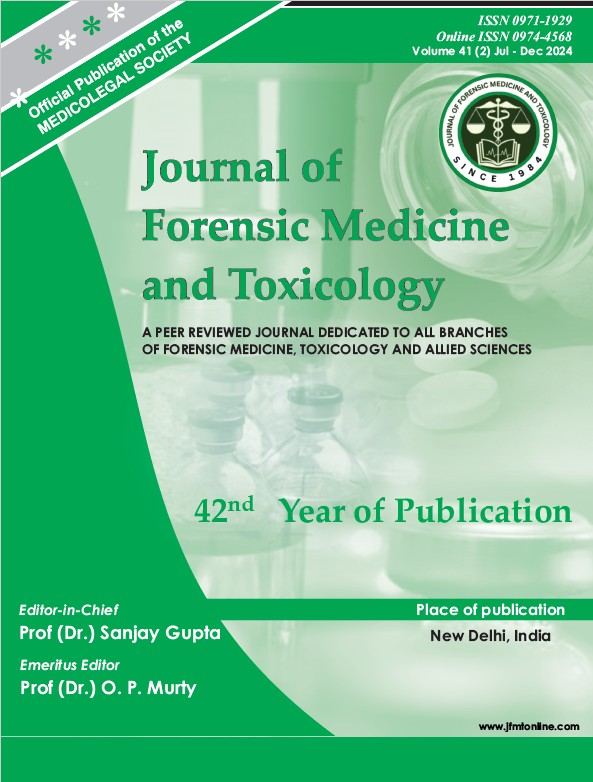Assessing Sexual Dimorphism of the Sternum: A Forensic Evaluation of the Sternal Index and Hyrtl’s Law
DOI:
https://doi.org/10.48165/jfmt.2025.42.3.7Keywords:
Sternal Index, Sexual Dimorphism, Forensic Anthropology, Hyrtl’s Law, Sternal Measurements, Cadaveric StudyAbstract
Background: Sex estimation plays a critical role in forensic investigations, particularly in cases involving incomplete skeletal remains. While the pelvis and skull are the most sexually dimorphic bones, alternative markers such as the ster num are gaining attention. This study investigates the utility of sternal measurements and the sternal index in determin ing sex and evaluates the applicability of Hyrtl’s Law in forensic contexts. Materials and Methods: A total of 132 cadavers (92 males, 40 females) were examined for sternal morphometry. Parameters measured included total sternal length, manubrium length, and mesosternum length. The sternal index was calculated and analyzed for sexual dimorphism. Additionally, the applicability of Hyrtl’s Law—stating that the manu brium is shorter than the mesosternum—was assessed in both sexes. Results: Males exhibited significantly greater sternal lengths compared to females. The mean sternal index was signifi cantly higher in females, indicating a potential marker for sexual dimorphism. However, notable overlap in sternal index values was observed—98.9% in males and 90% in females—limiting its reliability as a standalone indicator. Hyrtl’s Law was applicable in 71.73% of male cadavers but only in 40% of female cadavers, suggesting limited utility in female sex estimation. Conclusion: The sternum demonstrates measurable sexual dimorphism and may aid in sex estimation when key skeletal elements are unavailable. Although the sternal index and Hyrtl’s Law show potential, their application is constrained by significant overlap between sexes. Further research with larger and more diverse populations is recommended to enhance their forensic reliability.
Downloads
References
Wenzel J, cited by Ashley GT. A comparison of human and anthropoid mesosterna. Am J Phys Anthropol. 1956;14:449–465.
Hyrtl J, cited by Dwight T. The sternum as an index of sex, height, and age. J Anat Physiol. 1881;15:327–330.
Dwight T. The sternum is an index of sex, height, and age. J Anat Physiol. 1890;24(Pt 4):527–535.
Paterson AM. The human sternum. Williams and Norgate, London University Press of Liverpool. 1904; p.36–37 & 77.
Ashley. In: Rentoul E, Smith H, editors. Gli aster Medical Jurisprudence and Toxicology. London: Churchill Livingston; 1973. p.84–86.
Jit I, Jhingan V, Kulkarni M. Sexing the human sternum. Am J Phys Anthropol. 1980;53(2):217–224.
Franklin D, Flavel A, Kuliukas A, Cardini A, Marks MK, Oxnard C, O’Higgins P. Estimation of sex from sternal measurements in a Western Australian population. Forensic Sci Int. 2012 Apr 10;217(1–3):230.e1–5.
Dahiphale VP, Baheete BH, Kamkhedkar SG. Sexing the human sternum in Marathwada Region. J Anat Soc India. 2002;51(2):162–167.
Chandrakanth HV, Kanchan T, Krishan K. Osteometric analysis for sexing of modern sternum – an autopsy study from South India. Leg Med (Tokyo). 2014;16(6):350–356.
Bongiovanni R, Spradley MK. Estimating sex of the human skeleton based on metrics of the sternum. Forensic Sci Int. 2012 Jun 10;219(1–3):290.e1–7.
Singh J, Pathak RK. Morphometric sexual dimorphism of human sternum in a north Indian autopsy sample: sexing efficacy of different statistical techniques and a comparison with other sexing methods. Forensic Sci Int. 2013;228(1–3):174.e1–10.
Hunnargi SA, Ritesh GM, Herekar NG. Sexual dimorphism of human sternum in Maharashtrian population of India. J Anat Soc India. 2007;10(1):6–10.
Gautam RS, Shah GV, Jadar HR, Gohn BJ. The human sternum as an index of age and sex. J Anat. 2003;52(1):20–23.
Jaiswal R. Sternum as an index for determination of sex. Int J Anat Res. 2019;7(4.2):7070–7079.
Khartade HK, Shrivastava S, Shedge R, Meshram VP, Garg SP. Anthropometry of the sternum: an autopsy-based study for sex determination. Medico-Legal J. 2022;92(1):27–33. doi:10.1177/00258172221098948
Osunwoke EA, Gwunireama IU, Orish CN, et al. A study of sexual dimorphism of the human sternum in the southern Nigerian population. J Appl Biosci. 2010;26:1636–1639.
Narayan D, Varma HC. Sternal index for male and female in U.P. J Anat Soc India. 1958;7:71–72.




